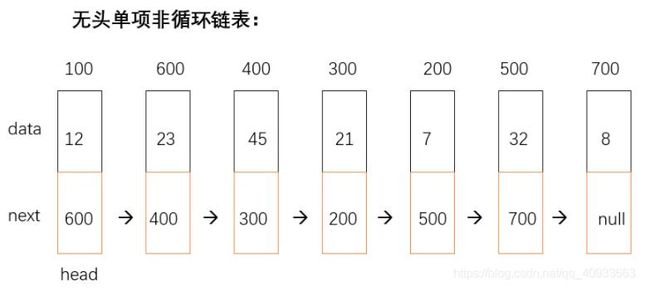本文实例为大家分享了Java实现单链表的基本操作,供大家参考,具体内容如下
顺序表:物理上逻辑上都连续;
链表:物理上不一定连续,逻辑上一定连续的。
链表的概念及结构
概念:连表示一种物理存储结构上非连续、非顺序的存储结构,数据元素的逻辑顺序是用过链表中的引用链接次序实现的。
8种链表结构:
单项、双向
带头、不带头
循环、非循环
主要的三种链表:
无头单项非循环链表、带头循环单链表、不带头双向循环链表
代码实现
1. 接口定义
package com.github.linked.Impl;
public interface ILinked {
// 头插法
void addFirst(int data);
// 尾插法
void addLast(int data);
// 任意位置插入,第一数据节点为0号下标
boolean addIndex(int index, int data);
// 查找是否包含关键字 key 在单链表中
boolean contains(int key);
// 删除第一次出现的关键字为 key 的节点
int remove(int key);
// 删除所有值为 key 的节点
void removeAllKey(int key);
// 得到单链表的长度
int getLength();
// 打印单链表
void display();
// 清空单链表以防内存泄漏
void clear();
}
2. 代码实现接口
package com.github.linked.Impl;
public class SingleListed implements ILinked {
// 节点类
class Node {
private int data;
private Node next;
public Node(int data) {
this.data = data;
this.next = next;
}
}
private Node head; //头节点
public SingleListed() {
this.head = head;
}
/**
* 头插法
* @param data 要插入的数据
*/
@Override
public void addFirst(int data) {
// 1. 拿到一个实体
Node node = new Node(data);
// 2. 插入
// 如果是第一次插入,直接到头节点
if (this.head == null) {
this.head = node;
} else { //不是第一次插入
node.next = this.head; // 插入的节点指向头节点
this.head = node; // 更新头节点
}
}
/**
* 尾插法
* @param data 要插入的数据
*/
@Override
public void addLast(int data) {
// 1. 拿到一个实体
Node node = new Node(data);
Node cur = this.head;
// 2. 插入
// 如果是第一次插入,直接到头节点
if (this.head == null) {
this.head = node;
} else {
// 找尾巴
while (cur.next != null) {
cur = cur.next;
}
// 退出上面的循环,cur所执行的位置就是尾节点
cur.next = node;
}
}
// 检测 index 该下标是否合法
private void checkIndex(int index) {
if (index < 0 || index > getLength())
throw new IndexOutOfBoundsException("下标不合法!");
}
// 找到下标为 index-1 位置的节点
private Node searchIndex(int index) {
checkIndex(index);
if (index == 0)
return null;
int count = 0; // 记录行走的步数
Node cur = this.head;
while (cur.next != null && count < index-1) {
cur = cur.next;
count++;
}
return cur;
}
/**
* 任意位置插入,第一数据节点为 0号下标
* @param index 插入的下标
* @param data 要插入的数据
* @return true
*/
@Override
public boolean addIndex(int index, int data) {
Node node = new Node(data);
Node cur = searchIndex(index);
// 如果链表为空,直接插入到头节点
if (cur == null) {
node.next = this.head;
this.head = node;
} else { // 链表不为空,插入到 cur 的位置处
node.next = cur.next; // 将node链接到cur的下一个节点
cur.next = node; // 再将cur链接到node
}
return true;
}
/**
* 查找是否包含关键字 key 在单链表中
* @param key 要查找的关键字
* @return 找到key返回true,否则返回false
*/
@Override
public boolean contains(int key) {
Node cur = this.head;
while (cur != null) {
if (cur.data == key) {
return true;
}
cur = cur.next;
}
return false;
}
// 找第一次出现的关键字为 key 的节点的前驱
private Node searchPre(int key) {
// 1. 是不是第一个节点 if(head,data == key)
Node pre = this.head;
if (pre.data == key) {
// 或者 return null;
return this.head;
}
// 2. if(cur.next.data == key)
while (pre.next != null) {
if (pre.next.data == key) {
return pre;
}
pre = pre.next;
}
return null;
}
/**
* 删除第一次出现的关键字为 key 的节点
* @param key 要删除的关键字
* @return oldData
*/
@Override
public int remove(int key) {
int oldData = 0;
Node pre = searchPre(key);
// 1. 若没有找到
if (pre == null) {
// return -1;
throw new UnsupportedOperationException("没有key的前驱");
}
// 2. 找到了,并且在第一个节点
if (pre == this.head && pre.data == key){
oldData = this.head.data;
this.head = this.head.next;
return oldData;
}
// 3. 找到了,并且不在第一个节点
Node delNode = pre.next; // 确定要删除的节点的位置
pre.next = delNode.next; // 让要删除的节点的前驱指向要删除的节点的后一个节点,进而删除该节点
return 0;
}
/**
* 删除所有值为 key 的节点
* @param key 要删除的节点的值
*/
@Override
public void removeAllKey(int key) {
Node pre = this.head;
Node cur = this.head.next;
// 遍历一遍链表
while (cur != null) {
// 若找到了关键字,进行删除
if (cur.data == key) {
pre.next = cur.next;
cur = cur.next;
} else { // 若不是关键字,继续查看链表的下一个
pre = cur;
cur = cur.next;
}
if (this.head.data == key) {
this.head = this.head.next;
}
}
}
/**
* 得到单链表的长度
* @return 单链表长度
*/
@Override
public int getLength() {
Node cur = this.head;
int count = 0; // 节点的个数
while (cur != null) {
count++;
cur = cur.next;
}
return count;
}
/**
* 打印单链表
*/
@Override
public void display() {
Node cur = this.head;
while (cur != null) {
System.out.print(cur.data + " ");
cur = cur.next;
}
System.out.println();
}
/**
* 清空单链表以防内存泄漏
*/
@Override
public void clear() {
while (this.head != null) {
Node cur = this.head.next;
this.head.next = null;
this.head = cur;
}
}
}
3. 测试代码
package com.github.linked.Impl;
public class TestDemo {
public static void main(String[] args) {
//MySingleListImpl mySingleList = new MySingleListImpl();
SingleListed mySingleList = new SingleListed();
mySingleList.addFirst(10);
mySingleList.addFirst(20);
mySingleList.addFirst(30);
mySingleList.addFirst(40);
mySingleList.addFirst(50);
System.out.println("头插:");
mySingleList.display();
mySingleList.addLast(100);
mySingleList.addLast(200);
System.out.println("尾插:");
mySingleList.display();
System.out.println();
System.out.print("单链表的长度:");
System.out.println(mySingleList.getLength());
System.out.println();
mySingleList.addIndex(1,15);
System.out.println("任意位置插入:");
mySingleList.display();
System.out.println();
System.out.println("查找是否包含关键字 key 在单链表中:");
System.out.println("查找关键字125:"+mySingleList.contains(125));
System.out.println("查找关键字30:"+mySingleList.contains(30));
System.out.println();
System.out.println("删除第一次出现的关键字为 key 的节点:");
System.out.println("删除头节点50:");
mySingleList.remove(50); //删除头节点
mySingleList.display();
System.out.println("删除中间节点30:");
mySingleList.remove(30); // 删除中间节点
mySingleList.display();
System.out.println("删除尾节点200:");
mySingleList.remove(200); // 删除尾节点
mySingleList.display();
System.out.println();
System.out.println("删除第一次出现的关键字为 key 的节点:");
mySingleList.addFirst(20);
mySingleList.display();
mySingleList.removeAllKey(20);
mySingleList.display();
System.out.println();
System.out.print("单链表的长度:");
System.out.println(mySingleList.getLength());
System.out.println();
// 测试内存泄漏
try {
Thread.sleep(1000);
System.out.println("睡醒了");
} catch (InterruptedException e) {
e.printStackTrace();
}
}
}
4. 测试结果
以上就是本文的全部内容,希望对大家的学习有所帮助,也希望大家多多支持脚本之家。

